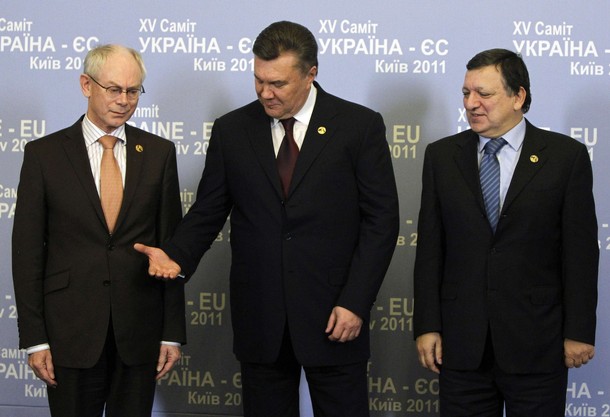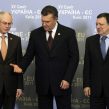
Tymoshenko’s Imprisonment Slows Integration with the European Union
Publication: Eurasia Daily Monitor Volume: 9 Issue: 2
By:

The association agreement with the EU comprising a free trade agreement was not signed or initialed at the Ukraine-EU summit in Kyiv on December 19. EU Council President Herman van Rompuy only formally announced that talks on the agreement were completed. He and European Commission President, Jose Manuel Barroso, made it clear to Ukrainian President, Viktor Yanukovych, that although the initialing of the agreement would be only a matter of time as it was technically ready, the signing and ratification could be delayed as long as former Prime Minister Yulia Tymoshenko remained in prison. After the summit failure, Ukraine is at a crossroads between integration into the EU and the Customs Union to which Moscow has invited Kyiv. The need to secure a lower price of Russian gas on which Ukraine’s industry heavily relies may prompt Yanukovych to move closer to Moscow.
The government initially planned to sign the documents at the December summit as the free trade talks were completed in October and the political association talks were completed in November. Yanukovych hoped that the European Commission would initial the agreement at the summit almost until the very last moment, apparently thinking that Ukraine was too important for the EU to delay the agreement. He did not take heed of warnings from EU officials that Tymoshenko’s imprisonment was taken very seriously as a sign that Kyiv did not share European values. It is widely believed in the West that a court in Kyiv sentenced Tymoshenko to seven years in prison last October for exceeding her authority in the 2009 gas talks with Moscow on Yanukovych’s orders, because she is a popular opposition leader who could defeat Yanukovych in the presidential election in 2015 and whose party may defeat his Party of Regions in next year’s parliamentary election.
Yanukovych told the summit that “the project of a united Europe will not be complete until such large European countries and nations as Ukraine remain outside” (Ukrainska Pravda, December 19). However, Kyiv reportedly failed to persuade Brussels to mention in the final text of the agreement Ukraine’s right to join the EU in the future, which should be published after initialing. The European commission only agreed to mention Ukraine’s “European identity,” according to a source in Brussels (Kommersant-Ukraine, December 20).
Yanukovych chided the EU for not opposing Russia’s South Stream gas pipeline project bypassing Ukraine. The view in Kyiv is that without South Stream, Russia would be more interested in investing in upgrading Ukraine’s pipelines carrying Gazprom’s gas to Europe which could also entail gas price discounts for Ukraine. Yanukovych reiterated his calls for the EU to join Ukraine and Russia in a consortium to be set up to manage Ukraine’s pipelines. However, the visitors from the EU were reluctant to discuss gas, with Barroso saying only that talks between Ukraine and Russia must not influence gas deliveries to Europe. The EU’s focus in the summit was on Tymoshenko.
Van Rompuy told Yanukovych that Tymoshenko’s “politically motivated” case was proof that Ukraine’s court system was politicized and said that the European Commission wanted to see more progress also as far as freedom of speech and meetings were concerned. He also said the EU would closely follow the parliamentary election campaign this year. Van Rompuy and Barroso said the signing of the association agreement would depend on Ukraine’s democratic progress (Ukrainska Pravda, December 19). European commission representative in Kyiv Jose Manuel Pinto Teixeira was blunter, commenting on the summit after it finished. He said the EU would not sign or ratify the agreement if the situation with democracy did not improve (Channel 5, December 19).
The summit was not a complete fiasco, since some observers had questioned whether it might take place. The foreign ministry has admitted that there were fears that dialogue between Ukraine and the EU would be frozen and the summit would be cancelled after Tymoshenko’s imprisonment (Interfax-Ukraine, December 29). Also Moscow, which has been long wary of Kyiv’s enthusiasm about the EU, invited Yanukovych to attend the summit of the Russian-dominated Customs Union, which hardly by coincidence was held simultaneously with the Ukraine-EU summit. However, Yanukovych preferred the EU, sending Prime Minister Mykola Azarov to Moscow.
Kyiv expects that the two sides will initial the association agreement by mid-February, 2012 (www.liga.net, December 19). Barroso also said at the summit that the agreement would be initialed shortly, but he noted that further progress would depend on adherence to the principles of the supremacy of law in Ukraine (UNIAN, December 19). However, on December 23, the Kyiv Court of Appeals upheld the Perhersky district court’s October 11 verdict to imprison Tymoshenko for seven years for the 2009 deal with Gazprom. Brussels must have taken that as a sign that its messages were ignored. EU High Representative for Foreign Affairs and Security Policy, Catherine Ashton, issued a statement on December 24, saying that the appeals court’s decision was inadequate. Ashton stressed that respect for the principle of the supremacy of law would be decisive for the speed of Ukraine’s political association and economic integration with the EU (Interfax-Ukraine, December 24).




